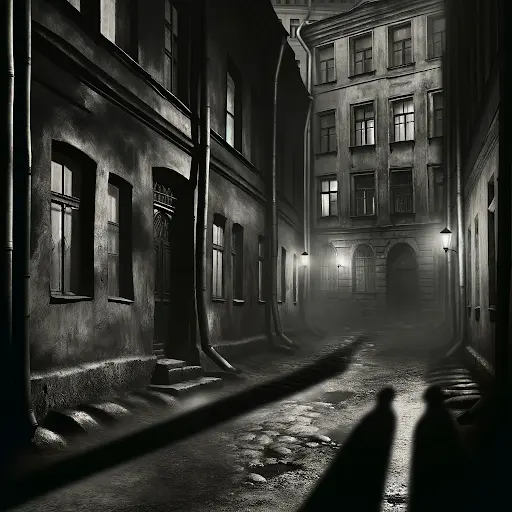Crime and Punishment novel review
Updated: 7 February 24
6
Introduction
“Pain and suffering are always inevitable for a large intelligence and a deep heart. The really great men must, I think, have great sadness on Earth.” Fyodor Dostoevsky
Diving into the complex world of “Crime and Punishment” by Fyodor Dostoevsky, we uncover a masterpiece that has stood the test of time, captivating readers with its deep exploration of morality, guilt, and redemption.
Written by one of the most profound literary figures of the 19th century, this novel remains a cornerstone of classic literature, offering insights into the human condition that are as relevant today as they were in 1866, the year of its first publication. Dostoevsky challenges us to question the very fabric of right and wrong through the troubled journey of its protagonist, Rodion Raskolnikov.

Author’s Background
“Power is given only to him who dares to stoop and take it… one must have the courage to dare.” Fyodor Dostoevsky
Fyodor Dostoevsky is a titan of literature, whose works have left an indelible mark on the world of fiction. His keen understanding of the human psyche, combined with his experiences of loss, financial instability, and political activism, culminated in the creation of novels that delve into profound philosophical and existential themes.
Dostoevsky’s expertise in portraying the depths of human thought and emotion is unmatched, making him an authoritative figure in classic literature. His recognition and awards over time only solidify his standing as a master storyteller whose works transcend cultural and temporal boundaries.

Main Content of the Review
Summary
“Crime and Punishment” transports us into the mind of Rodion Raskolnikov, a destitute former student in St. Petersburg, who conceives a plan to murder a pawnbroker for her money. Dostoevsky intricately weaves a narrative that explores Raskolnikov’s internal conflict and the ramifications of his actions, both legal and psychological.
The novel unfolds Raskolnikov’s journey through despair, isolation, and the quest for redemption, engaging with a multitude of characters that embody the diverse spectrum of Russian society at the time.

Critical Analysis
The strength of “Crime and Punishment” lies in its deep psychological insight and its exploration of complex moral questions. Dostoevsky’s portrayal of Raskolnikov’s turbulent inner world sets a precedent for character development in literature.
However, the novel’s dense philosophical discourse may pose a challenge for some readers. Compared to other works of its time, “Crime and Punishment” stands out for its innovative narrative technique and its profound ethical inquiry, making it a pioneering work in the psychological novel genre.

Personal Reflection
Reading “Crime and Punishment” was a journey into the depths of my own conscience, prompting me to reflect on the nature of guilt and the possibility of redemption. The novel’s exploration of the consequences of one’s actions resonated deeply with me, highlighting the complex interplay between societal norms and personal morality.
Recommendation
This novel is a must-read for those intrigued by psychology, philosophy, and the ethical dilemmas faced by individuals. Its timeless relevance speaks to anyone wrestling with the notions of right and wrong, making it a profound choice for readers seeking to understand the complexities of human nature.
Conclusion
“Crime and Punishment” by Fyodor Dostoevsky is more than just a novel; it is a deep dive into the human psyche, exploring the boundaries of morality through the lens of literature. Its enduring relevance and profound insight into the themes of guilt, punishment, and redemption make it an essential read for anyone seeking to understand the complexities of human behavior. I encourage readers to share their thoughts and interpretations of this timeless classic.

FAQs
When was “Crime and Punishment” published?
“Crime and Punishment” was first published in 1866.
What are the main themes of “Crime and Punishment”?
The novel explores themes of morality, guilt, redemption, and the psychological turmoil of isolation.
Is “Crime and Punishment” based on a true story?
While not based on a specific true story, Dostoevsky’s novel is deeply influenced by his observations of Russian society and his philosophical contemplations.
How does Dostoevsky develop Raskolnikov’s character throughout the novel?
Raskolnikov’s character is developed through his internal struggles, interactions with other characters, and the evolution of his moral and psychological state.
Why is “Crime and Punishment” considered a classic?
Its innovative exploration of psychological depth, moral questions, and its influence on the development of the novel as a literary form solidify its status as a classic.
Author Bio of the Reviewer:
My Review Book (MRB) is your go-to source for in-depth and thoughtful book reviews. Our team, composed of passionate readers with diverse backgrounds, brings a unique perspective to each review. Our commitment to exploring the essence of every book ensures that our recommendations are tailored to help you find your next great read. Join us on this literary journey, where every book tells a story beyond its pages.
Please Write Your Comments